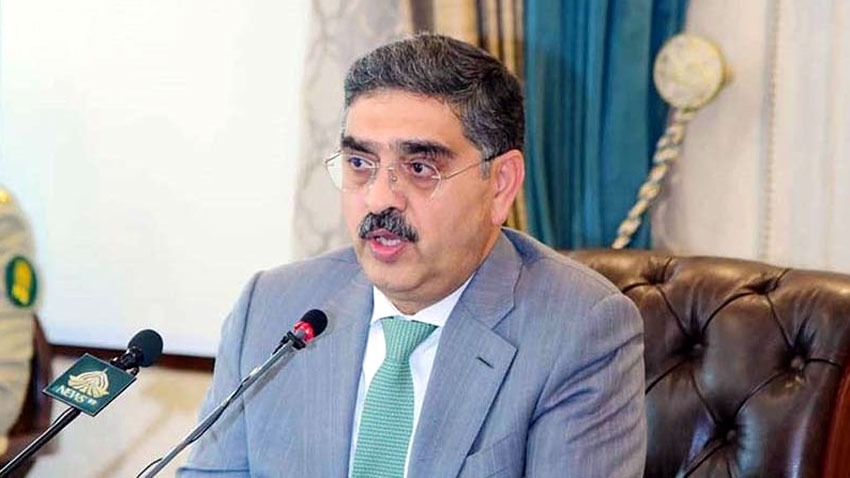Caretaker Prime Minister Anwaar-ul-Haq Kakar has urged US President Joe Biden to constructively engage with Pakistan, saying that acknowledging the country’s role in regional and global matters is need of the hour.
The premier said this in an interview with CNBC on the sidelines of the World Economic Forum in Davos on Wednesday.
When asked what is Pakistan’s message to the Biden administration ahead of the February 8 polls, the premier said: “Pakistan is a country of consequence, not a country of concern so we Pakistan should be constructively engaged.”
PM Kakar said Pakistan is a mid-sized power and its actual potential and role needs to be appreciated.
Kakar said Pakistan Tehreek-e-Insaf founder Imran Khan was not incarcerated due to his political opinion but for his “alleged role in committing riots and encouraging arson”.
The interim premier said such behaviour is dealt with by the law “even in settled democracies” and added all those who took part in the May 9 riots are behind bars as he drew comparisons with the attack on the US Capitol in 2021.
Kakar, replying to whether the charges against Imran are politically motivated as he has claimed the same, said the courts should be the judge of that. “He has all the right to say that but let the courts decide that. It is not for me, for the media or for public opinion to decide this question”.
The caretaker premier was also asked about the state of media in Pakistan and said that the media in the country is “freer” than in the West as it is under stricter regulations there.
“I think so even freer than the Western media. If you do the comparison, the Western media is probably under more stricter regulations than the media in Pakistan.”
He also maintained that general elections in the country are scheduled for and will be held on February 8.
Kakar stressed that this date is a constitutional obligation, and everyone in the country is dedicated to adhering to it.
The premier highlighted that the citizens of Pakistan will have the opportunity to exercise their right to vote, thereby selecting a government of their choice for the next five years. He also expressed confidence that the elections will pave the way for a stable government, contributing to overall economic stability.
Addressing concerns that the elections would be “rigged”, the premier said the polls should first be held and then the conduct can be questioned.
“First they said, we are not going to have elections. Now, when we are having an election, they are saying, ‘Oh, it is one of the most rigged elections in history’.”
Talking about the increase in terrorist attacks in the country, Kakar said “it is the situation and the circumstance in which we are living” and added that he does not blame the return of the Taliban in neighbouring Afghanistan or the administration of US President Joe Biden.
“We did foresee that there would be implications for Pakistan when the US and Nato withdrawal would happen. And that is why Pakistan was advocating for a responsible withdrawal.
He also said that as of right now, he thinks “Pakistan is on its own” in dealing with terrorism and highlighted the proliferation of arms left behind by the international coalition in Afghanistan. He predicted that the development would also have implications for the wider region.
Addressing the economic situation, Prime Minister Kakar informed that the International Monetary Fund Board has approved the country’s second tranche. He emphasised that the caretaker government’s priority has been to stimulate economic revival, focusing on growth and various economic indicators.
Moreover, Kakar announced the forthcoming publication of a white paper detailing the interim government’s performance over the past four to five months.
He disclosed initiatives such as a revamped taxation program, an aggressive privatisation drive, and a reduction of federal expenditures. Additionally, efforts are underway to collaborate with provinces to rationalize their spending, he said.
In response to a query about terrorism, Kakar underscored the necessity for a regional approach to enhance counter-terrorism capabilities. He highlighted that Pakistan, as a mid-sized power, deserves recognition for its actual potential and role.
Regarding relations with China, he stated that Pakistan maintains strategically close ties with Beijing. He asserted that, regardless of regional or global developments, the relationship with China remains unaffected and resilient.
He said that Pakistan was a transitional democracy, saying that such democracies faced “domestic challenges”.
“I am not saying we are living in a settled, ideal democracy […] Yes there are concerns but we will try, as much as we can, to give a chance to the people so that they can elect their future leadership in a very fair manner.”
Warning of a risk of a “spillover effect”, he emphasised, “Even at a global level, I feel the strengthening of the structure-level [and] institution-level of Pakistani state is very much required.”
The interview also touched upon the deportation of illegal immigrants from Pakistan, most of whom are Afghan.
“There were people for the last four to five decades and few of them no doubt were engaged with our terrorism challenge, with our crime challenge, with our organised crime challenge and other social evils, but not all of them,” he said.
Kakar highlighted that there was “no perpetual ban” on the deported immigrants.
“If they want to return to the country, they can do [so] by receiving their travel documents from back home and have regulated movement,” he said.
Asked if US actions in Afghanistan had brought Pakistan closer to China, the premier responded in the negative, adding: “With China, we are strategically close. We have history with the Chinese [people].
“Pakistan still enjoys and remains pretty much close to the Chinese state and no matter what happens in the region, either in Afghanistan or anywhere else, that will not affect our relationship with China,” he asserted.










